|
|
|
Sort Order |
|
|
|
Items / Page
|
|
|
|
|
|
|
| Srl | Item |
| 1 |
ID:
137219
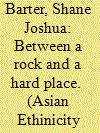

|
|
|
|
|
| Summary/Abstract |
Secessionist movements are often motivated by a sense of exclusion, abuse, and assimilation at the hands of host states. But in waging armed struggles and constructing ethnic nationalisms, they may replicate such grievances against their own minorities. This paper seeks to provide a deeper understanding of how ‘second-order minorities’ respond to secessionist ethno-nationalism. Based on ethnographic research in Aceh, Indonesia, this paper looks to how Javanese, Malay, Alas, and Gayo communities responded to Acehnese secessionism. Aceh’s minorities did not support Aceh’s rebels, opting to flee or resist rebellion. In explaining their reaction, I suggest that the same ethno-nationalist project which united many Acehnese in the secessionist struggle served to repel non-Acehnese communities, leading to ethno-nationalist revivals among Aceh’s minorities and continued tensions in the post-conflict era.
|
|
|
|
|
|
|
|
|
|
|
|
|
|
|
|
| 2 |
ID:
109956
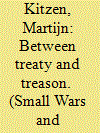

|
|
|
|
|
| Publication |
2012.
|
| Summary/Abstract |
Recent counterinsurgency experiences in Iraq and Afghanistan have demonstrated that the local operating environment often is dominated by indigenous power-holders. As counterinsurgents seek to establish control over the local population, collaboration with these agents has become an essential aspect of contemporary counterinsurgency. Although the practice of constructing collaborative relationships with indigenous power-holders might be perceived as unconventional by today's counterinsurgents, the approach itself goes back to the colonial era in which modern counterinsurgency has its roots. This article explores the dynamics, benefits, and dangers of collaborative relationships with indigenous power-holders by analysing an infamous episode in Dutch colonial history, the case of the collaboration between Dutch colonial authorities and warlord Teuku Uma during the Aceh War (1873-1913). This relationship ended in disaster for the Dutch as Uma departed their side at the moment he had become their pivotal asset in the local political landscape. The article explains that the Dutch succeeded to co-opt Uma, but failed to control him as they lacked the will and means to do so. Furthermore this case study provides an insight in the way the Dutch colonial authorities dealt with the complex process of intelligence-gathering in a fragmented indigenous society.
|
|
|
|
|
|
|
|
|
|
|
|
|
|
|
|
| 3 |
ID:
104445
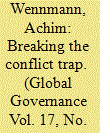

|
|
|
| 4 |
ID:
088357
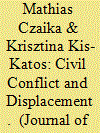

|
|
|
|
|
| Publication |
2009.
|
| Summary/Abstract |
The purpose of this article is to identify the determinants of displacement behavior based on various push and pull factors at the village level. The study concentrates on changes in village population during three years of civil conflict (1999-2002) in Aceh, Indonesia. The empirical analysis is based on a unique dataset from two census rounds of the Indonesian Village Potential Census (PODES). It uses data on around 5,200 Acehnese villages and relates village-level population change to conflict variables, geographic patterns, and traditional socio-economic determinants of migration. By applying quantile regressions, the push (outflow) factors and the pull (inflow) determinants of migration can also be distinguished. The authors identify the following factors as the main determinants of the Aceh migration pattern in this period. First, conflict clashes induced large rearrangements of the population between villages in highly affected districts, as well as strong village emigration from the geographically remote regions in Central Aceh towards the less conflict-affected coastal industrial areas. Besides conflict factors, an (ongoing) rural-urban migration process, driven by socio-economic factors, has taken place during the conflict period. Second, there is also evidence that security considerations, such as the presence of police in a village or neighborhood, were either emigration-reducing or immigration-inducing. Third, although the presence of ethnic Javanese has not been a primary cause of conflict incidence, their intimidation by the rebel movement has led to a significant outflow, primarily from conflict-affected villages in Central Aceh. These results reveal that, beside a conflict-induced fear of violence, population movements in Aceh have also been an outcome of traditional migration determinants.
|
|
|
|
|
|
|
|
|
|
|
|
|
|
|
|
| 5 |
ID:
153686
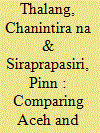

|
|
|
|
|
| Summary/Abstract |
Peace negotiations are shaped not only by the agents of conflict, but also by the structures in which they interact. From a comparative perspective, this article examines how both structural and agential factors have influenced the trajectory of the peace processes in Aceh and in Thailand’s southern border provinces.
|
|
|
|
|
|
|
|
|
|
|
|
|
|
|
|
| 6 |
ID:
079924
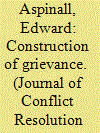

|
|
|
|
|
| Publication |
2007.
|
| Summary/Abstract |
This article makes a case for extending social constructivist approaches to the study of grievance in natural resource conflicts. It does this by analyzing the separatist conflict in Aceh, Indonesia, which is often portrayed as a paradigmatic resource conflict due to the importance of the natural gas industry there. It is argued here, however, that natural resource exploitation promoted conflict in Aceh only because it became entangled in wider processes of identity construction and was reinterpreted back to the population by ethnic political entrepreneurs in a way that legitimated violence. Rather than any intrinsic qualities of natural resource extraction, the key factor was the presence of an appropriate identity-based collective action frame. The argument is strengthened by comparison with two other resource-rich Indonesian provinces where resource extraction patterns were similar to Aceh but where no protracted violence occurred because similar identity resources were not available to local actors
|
|
|
|
|
|
|
|
|
|
|
|
|
|
|
|
| 7 |
ID:
113279
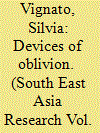

|
|
|
|
|
| Publication |
2012.
|
| Summary/Abstract |
Since the peace agreement has put an end to the 30-year-long civil conflict in the province of Aceh in Indonesia, poverty, parental loss, lack of opportunities and an old tradition have caused a growing number of Acehnese girls and boys to spend between three and ten years in residential Koranic schools [dayah or pesantren]. There, they process their experience of the conflict, be it direct or indirect. In this article, thanks to ethnographical data, the author explores this labour of transformation. An idea of resilience which is culturally based in local societies is analysed. Key issues are the difference between personal and social resilience, plus the transformations that a resilient process enhances in the very culture from which it stems. The dayah have proved very effective structures in facing the needs of the poorest Acehnese children. Nevertheless, the author argues, they tend to shape the children according to a general model that can create exclusion and crystallize pre-existing psychic suffering. This paper indicates that different visions of trauma and memory characterize different parts of the same society, and that selecting one or another is a political choice that is embedded in international policies.
|
|
|
|
|
|
|
|
|
|
|
|
|
|
|
|
| 8 |
ID:
153719
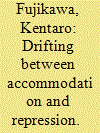

|
|
|
|
|
| Summary/Abstract |
A central government facing separatist activities adopts various policies to respond to them. In some cases, the government represses them harshly, while in other cases, it tries to accommodate the separatists’ demands. We currently have two strands in the literature to understand which policies are implemented by the government: the reputation theory and the cost-benefit calculation model. However, neither of them is sufficient to explain Indonesia's policies toward its separatists in Aceh and Papua following democratization. Indonesia's policies toward separatists have been drifting between accommodation and repression. To understand these policy shifts, this paper emphasizes the importance of the inner workings of the central government, introducing two variables: the preferences of national leaders and the existence of veto players. This paper demonstrates that these perspectives are essential in order to fully explain the Indonesian government's policies toward its separatists.
|
|
|
|
|
|
|
|
|
|
|
|
|
|
|
|
| 9 |
ID:
084036
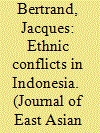

|
|
|
|
|
| Publication |
2008.
|
| Summary/Abstract |
Beginning in the mid-1990s, there was a sudden rise in violent ethnic conflict in Indonesia. Two aspects that require explanation are the timing and clustering of this type of conflict historically. Other studies have not adequately explained these aspects. Methodological and thematic choices have generated problems with identifying and explaining clustering. Microlevel studies fail to account for the broader changes occurring at a macrolevel. Some researchers have chosen to broaden the scope of analysis of violent events to provide explanations of violence more generally. After reviewing these other studies, I argue that a historical institutionalist approach remains best able to explain the clustering of conflicts and the following period of stability. Changing institutional contexts at critical junctures created rising anxieties as well as opportunities to renegotiate group inclusion and status in the Indonesian state.
|
|
|
|
|
|
|
|
|
|
|
|
|
|
|
|
| 10 |
ID:
114685
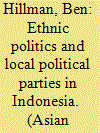

|
|
|
|
|
| Publication |
2012.
|
| Summary/Abstract |
Since Indonesia's return to multiparty democracy in 1999, national law makers have introduced regulations that effectively ban ethnic or regionally based political parties. A major exception to the rule can be found in the province of Aceh where ethnic separatists were granted the right to form their own political party to contest local elections in return for giving up their armed struggle for independence. In legislative elections held in 2009 the party of the former rebels - the Aceh Party - won a landslide victory. Drawing on in-depth interviews with national party leaders and parliamentarians, this article examines the implications of the rise of the Aceh Party for Indonesia's political party system and the potential for ethnic-based parties to resolve ethnic conflict and secessionism in other parts of Indonesia, including in Papua where the failure of special autonomy arrangements has led to increased militancy among indigenous Papuans.
|
|
|
|
|
|
|
|
|
|
|
|
|
|
|
|
| 11 |
ID:
086964
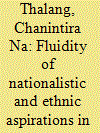

|
|
|
|
|
| Publication |
2009.
|
| Summary/Abstract |
Peace negotiations between the Indonesian government and the Free Aceh Movement (GAM) have resulted in the signing of the Memorandum of Understanding (MoU) ultimately ending a three-decade-long struggle for independence. Through a historical comparative analysis, this article explores the changing nature of Acehnese nationalism. It explores how Acehnese ethnicity and nationalism are constructed and how they have transformed over the decades in conflict with the Indonesian government. Acehnese ethnicity and nationalism, which are political in nature and ethnic in character, have ideologically shifted throughout time. Historical junctures and myths were utilised to legitimise these changing ideological goals. Despite the transformation of Acehnese nationalism and consequent changes in its ideological basis, a strong Acehnese identity still remains a constant.
|
|
|
|
|
|
|
|
|
|
|
|
|
|
|
|
| 12 |
ID:
119171
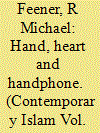

|
|
|
|
|
| Publication |
2013.
|
| Summary/Abstract |
The state implementation of Islamic law in the special autonomous region of Aceh (Indonesia) presents a complex and compelling case for examining some of the central themes of this special issue, particularly the attempt to understand the complex entanglements of secular nation states with contemporary religious movements. These dynamics are particularly energized in contemporary Aceh, where a state-directed project for the formal implementation of shari`a has been pursued alongside broader agendas for social reconstruction following the devastating 2004 tsunami and the subsequent end of decades of violent conflict between the 'Free Aceh Movement' (GAM) and the central Indonesian government. This article explores a heretofore un-examined source base - that of 'Text Messages (SMS) to the Editor' printed in a local newspaper - to gain new perspective on local debates over the role of Islam and official state structures in building a 'new Aceh'. This material presents a striking example of the complexity and contestation of popular discourses on Islamic law and society well beyond the realm of specialist spokesmen.
|
|
|
|
|
|
|
|
|
|
|
|
|
|
|
|
| 13 |
ID:
117650
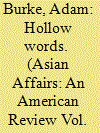

|
|
|
|
|
| Publication |
2012.
|
| Summary/Abstract |
Many foreign aid agencies promote peacebuilding as a global policy objective. This paper considers how they have fared in practice in subnational, "peripheral" conflicts in Asia that have relatively low international profiles, using case material from Aceh in Indonesia, the Far South of Thailand, and Sri Lanka. Foreign aid has supported long-term economic growth in these countries but typically failed to address peacebuilding concerns or associated inequalities between ethnic groups. Many barriers limit the scope to promote peacebuilding, stemming from recipient governments' reluctance to accept external involvement and from aid agencies' own limitations. Those agencies that do address conflict concerns tend not to use technical peacebuilding tools or methodologies. Instead, they prioritize the root causes of conflicts, recognizing human rights protection and equality of opportunity as policy aims. They also devise responses locally, build good relationships with governments, and work incrementally from a strong knowledge base. Wider adoption of similar policy objectives and practice would enable further small-scale peacebuilding initiatives.
|
|
|
|
|
|
|
|
|
|
|
|
|
|
|
|
| 14 |
ID:
147189


|
|
|
|
|
| Summary/Abstract |
An important factor shaping rebel-to-party transformations and post-conflict party governance pertains to how these groups relate to their former rank and file. While drawing on veterans of the war provides for stable source of support and organisational stability for the former rebel parties, ex-combatants may also pose challenges to such parties as they expect continued political influence, material rewards and social recognition for their contribution to the armed group. By identifying ex-combatants as a distinct interest group this argues that party-ex-combatant interaction directly shapes intra-party dynamics as well as policy formulation. Focusing on former rebel parties and ex-combatant interest group mobilisation in Aceh and East Timor, and this articles asks: How does rebel group mobilisation affect how former rebel parties mobilise political support? How do parties address and integrate demands made by ex-combatants?
|
|
|
|
|
|
|
|
|
|
|
|
|
|
|
|
| 15 |
ID:
138864
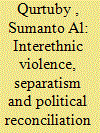

|
|
|
|
|
| Summary/Abstract |
This comparative article discusses the local dynamics of interethnic violence and separatist movement in Turkey and Indonesia, and examines the role of the central governments in these two countries in responding to, and resolving, the conflict and separatism. More specifically, the article focuses on Turkish–Kurdish conflict and Indonesian–Acehnese violence, and explores perspectives of the secessionist groups of Kurdistan Workers Party (PKK) and Free Aceh Movement (GAM) with regard to the quest of justice and conciliation. The heart of this article is to investigate the dynamics of micropolitics of political reconciliation and attempts at conflict resolution and peacebuilding between Ankara and PKK as well as Jakarta and GAM aiming at identifying the root causes underlying Turkey’s failure and Indonesia’s success in addressing their ethnic problems.
|
|
|
|
|
|
|
|
|
|
|
|
|
|
|
|
| 16 |
ID:
183455


|
|
|
|
|
| Summary/Abstract |
The Westphalian system provides the global context of international relations within which the recent and contemporary ‘small wars and insurgencies’ of Maritime Southeast Asia have developed. Usually dated to the Peace of Westphalia in 1648, ending the Thirty Years’ War in Europe, the Westphalian system located sovereignty in states, following the principle of cuius regio, eius religio (whose realm, their religion). This system replaced arrangements where sovereignty was more mixed, leading at times to conflict over the location of authority.
|
|
|
|
|
|
|
|
|
|
|
|
|
|
|
|
| 17 |
ID:
102497
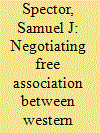

|
|
|
|
|
| Publication |
2011.
|
| Summary/Abstract |
The proposal of new negotiation formulae in the midst of stalemated conflicts can help to reframe the problem and restart dialogue. They can also unleash new controversy. The Moroccan Initiative for Negotiating an Autonomy Statute for the Sahara Region is a formulaic proposal advanced by Morocco to describe the broad outlines for Sahrawi autonomy under Moroccan sovereignty. It has been the subject of debate within the international community since it was first introduced in April 2007. Until now, however, discussion of its efficacy as a formulaic basis for a negotiated resolution to the Western Sahara dispute has largely outweighed serious consideration of how the proposal relates to current understandings of international law concerning self-determination and free association. Like Western Sahara, the Cook Islands, Niue, Aceh, New Caledonia, and Bougainville are cases of non-self-governing territories and other high autonomy arrangements where there has been recognition of the need to substitute, as the basis for ending the conflict, a comprehensive negotiated political status, in place of frequently unworkable or unattractive alternatives such as a contentious referendum on independence, open-ended talks, or continued armed conflict. In light of the lessons learned from actual state practice and international responses in the foregoing cases, an assessment of the present Moroccan proposal demonstrates that with some improvements, it may offer a viable new starting point for negotiations. The result of using this plan as a formula to restart negotiations can be the attainment for Western Sahara of a full measure of self-government - in a manner consistent with international law - by means of free association.
|
|
|
|
|
|
|
|
|
|
|
|
|
|
|
|
| 18 |
ID:
144297
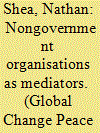

|
|
|
|
|
| Summary/Abstract |
The emergence of international NGOs mediating in intrastate conflicts has been labelled by The Economist as ‘privatizing peace’. This article explores this growth and the tensions brought about by the unofficial standing of NGO mediators. Primary among these is the power differential experienced by weak mediators, whereby they are perceived as unable to deploy the necessary inducements to create conditions favourable for a resolution. This article reviews NGO strengths and weaknesses as mediators by undertaking a case study analysis of the role of the Centre for Humanitarian Dialogue (1999–2003) and the Crisis Management Initiative (2005) in the peace processes in Aceh, Indonesia. It is concluded that despite evident limitations in terms of resources and leverage, within the specific context of the Aceh conflict, the characteristics of the NGO mediators and the mediation strategies adopted by the NGOs allowed them to implement an effective mediation process, and resulted in favourable mediation outcomes.
|
|
|
|
|
|
|
|
|
|
|
|
|
|
|
|
| 19 |
ID:
148293
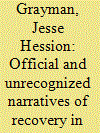

|
|
|
|
|
| Summary/Abstract |
Anthropological analyses of post conflict narratives reveal how strategic interests mobilize to resolve or perpetuate conflict. Three years after the 2005 Helsinki peace agreement between the Government of Indonesia and the Free Aceh Movement (GAM) that ended GAM’s thirty-year separatist rebellion, the author led a post conflict programming evaluation. Drawing upon qualitative interviews of rural informants for this study and using an anthropological approach to narrative analysis, this article argues that recovery narratives can be understood in terms of official and counter-official discourses, each utilizing strategic resources to amplify their interpretation of an unfolding peace process. Subaltern narratives heard most clearly are empowered because they adhere to narrative conventions proscribed by the peace agreement and other powerful discourses such as GAM’s separatist ideology. Other unrecognized voices are left out; their stories of recovery resist easy interpretation and sidestep clichéd narratives of peace.
|
|
|
|
|
|
|
|
|
|
|
|
|
|
|
|
| 20 |
ID:
129049
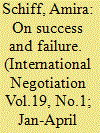

|
|
|
|
|
| Publication |
2014.
|
| Summary/Abstract |
This study presents a comparative analysis of two case studies in which attempts were made to resolve intractable ethno-national conflicts: the peace process undertaken in Aceh between the Government of Indonesia and the Free Aceh Movement, which led to the signing of the Helsinki Memorandum of Understanding (mou) ending the conflict in Aceh; and the process conducted in the Sri Lanka conflict from 2001 through 2004 between the Government of Sri Lanka and the Tamil Tigers, which failed to yield an agreement. The two peace processes will be examined using readiness theory, which focuses on the factors influencing the decision to enter into negotiations. This article also attempts to extend the hypotheses of readiness theory to explore the process of concession-making during the negotiations that took place in the two case studies. The findings indicate that the theory does contribute to understanding the dynamics of the pre-negotiation in both case studies and that applying its hypotheses may contribute to the understanding of the dynamics of the process of reaching an agreement in the Aceh process and of the factors leading to the failure of the negotiations in the Sri Lanka conflict. The analysis also gives rise to some questions that challenge readiness theory and its hypotheses - empirically and methodologically.
|
|
|
|
|
|
|
|
|
|
|
|
|
|
|
|
|
|
|
|
|